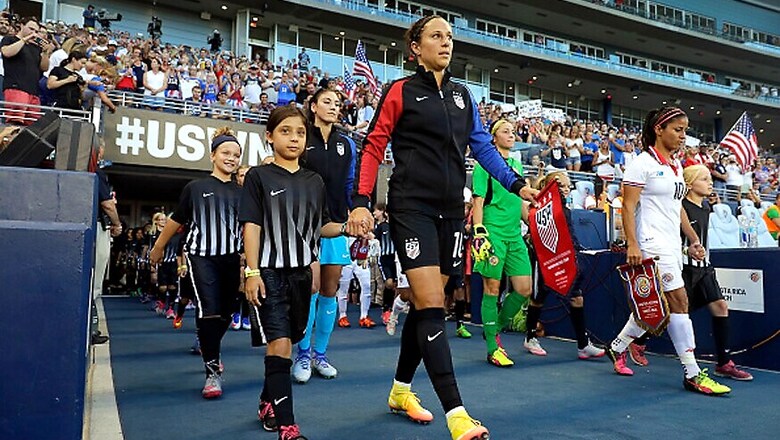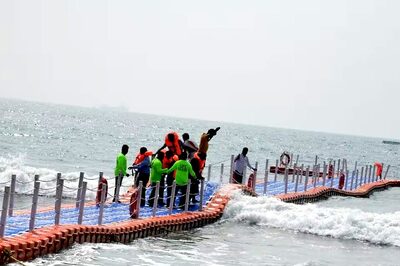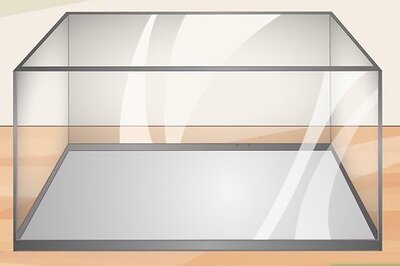
views
While a labor dispute simmers at home, the U.S. women's national soccer team is set to travel across Brazil as the favorite to win its fourth straight Olympic gold medal.
The Rio Games are happening as a U.S. federal agency looks at a wage discrimination complaint filed by a group of national team players who claim they make less money than their male counterparts. The team's union also is looking for a new contract with U.S. Soccer.
Intrigue is nothing new for the top-ranked Americans.
Unlike the men's tournament, which requires teams to field under-23 squads, women's Olympic soccer brings together the best players in the world.
Seeking to clinch its fifth gold medal since women's soccer became an Olympic sport in 1996, the U.S. makes its debut against New Zealand on Aug. 3 — two days before the opening ceremony in Rio. That'll be followed by games against powerhouse France and Colombia in Group G.
Second-ranked Germany, fifth-ranked Australia, sixth-ranked Sweden and host Brazil loom as potential quarterfinal opponents.
The tournament will be played in seven venues across Brazil, including the jungle city of Manaus, in the Amazon rain forest, where the U.S. faces Colombia on Aug. 9.
Last year, U.S. players led a protest against the artificial turf used in the World Cup in Canada before winning their third tittle in the tournament. Heading into the Olympics, the women have been vocal about gender equity in the sport as they seek a new collective bargaining agreement with U.S. Soccer.
On the field one of the biggest issues for the Americans heading into the Olympics was the status of reigning FIFA Player of the Year Carli Lloyd's right knee.
Lloyd, who wowed fans with three goals in 16 minutes in the 5-2 win over Japan in July's World Cup final, sprained her MCL in an April game with her club team, the Houston Dash. The team was cautious with her recovery, but it appears as if Lloyd is healthy and ready to play for her third gold medal.
Lloyd also scored the deciding goals in the gold medal matches in both the 2008 and 2012 Olympic Games.
ANOTHER KEY INJURY: Megan Rapinoe's status, at least for the start of the games, is far less certain. The winger tore her right ACL during a training session in Hawaii before a scheduled World Cup victory tour match last year (the match was ultimately canceled because of poor artificial turf conditions). The injury required her third ACL surgery.
On her blog, the 30-year-old Rapinoe wrote on June 9: "My Olympic dream is still alive! This blonde ain't gone!" And coach Jill Ellis named her to the 18-player squad for the Olympics, a good sign. But she may not play in the group stage.
MARTA'S MOMENT: Marta is one of the biggest stars in women's soccer. The 30-year old Brazilian striker was voted FIFA Player of the Year for five consecutive years from 2006 to 2010. Yet despite her success she is not a household name in her country, where the focus will be on Neymar and the men's squad to win Brazil's first Olympic gold.
Marta and the rest of the Brazil women's team will face less pressure to win their first gold than their male counterparts, and the squad should benefit from friendly home crowds.
The woman that Pele himself dubbed "Pele in skirt" showed she is ready for Olympic duty, scoring both goals in a 2-0 victory over Canada in Toronto in June.
Brazil faces China, South Africa and Sweden in Group E.
SILVIA'S FINAL BOW
One of the game's most respected coaches will be stepping down following the Olympics. Silvia Neid has been head coach of the German senior team since 2005. During her tenure the Germans won a World Cup (2007), two UEFA women's championships (2009, 2013) and the Olympic bronze medal in Beijing. Also a decorated former player for Germany, Neid has twice been honored as the FIFA women's coach of the year.
She will continue as scouting coach for the Germans, while current assistant Steffi Jones will take over as head coach.
Germany leads Group F with Canada, Australia and Zimbabwe.
CANADA'S REVENGE?
While the London Games showed that Canada is a team on the rise under coach John Herdman, the bronze medalists thought they could have done better.
The Canadians fell 4-3 in an overtime semifinal match to the eventual gold medal-winning U.S. team, a game that featured a non-call on what appeared to be a missed handball by an American player in front of the U.S. goal.
"We feel like we didn't lose. We feel like it was taken from us," said Canada captain Christine Sinclair, who was later suspended four games for her comments. "It's a shame in a game like that, which is so important, that the ref decided the result before the game started."
WALTZING WITH THE MATILDAS: No other Australian senior national team — male or female — had won an elimination game in a World Cup until the Matildas last summer; they knocked off Brazil in the round of 16. While they were defeated by Japan, it was considered a big move toward future success.
Australia went on to earn a spot in the Olympics, its first since 2004, in the Asian qualification tournament. As a result, its international ranking jumped four spots to No. 5.
Australia has never advanced past the quarterfinals in two Olympic appearances.


















Comments
0 comment